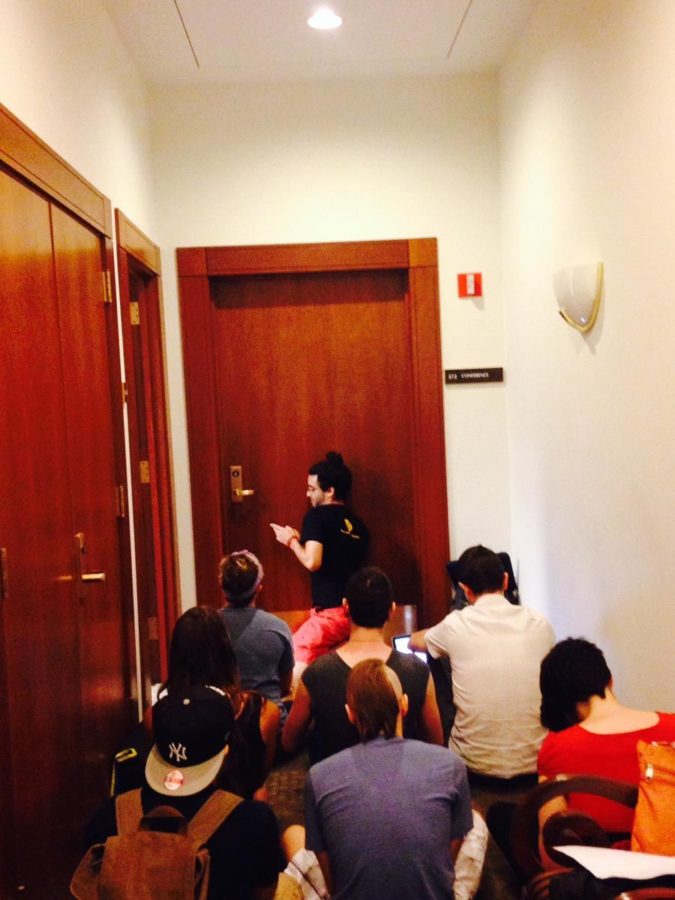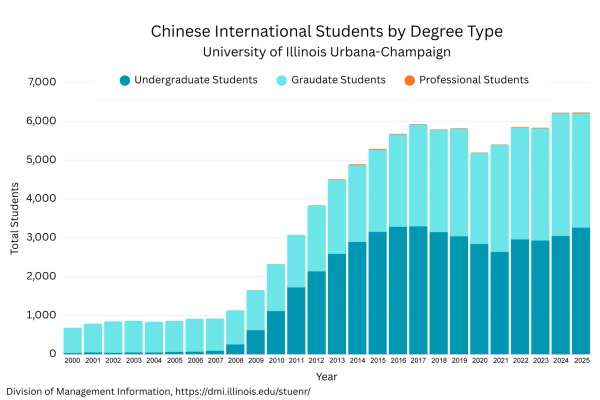Students form sit-in at Board of Trustees Executive Committee meeting regarding Salaita’s future
Students sit outside of the Board of Trustees’ Executive Committee meeting on Friday, Aug. 22 to speak out against the University’s decision to withdraw Steven Salaita’s appointment as a professor for the American Indian Studies program. Trustees denied Salaita’s supporters a chance to speak at the meeting.
Aug 26, 2014
Last updated on May 11, 2016 at 03:17 a.m.
Students crowded the hallway in an impromptu sit-in outside a meeting of the Executive Committee of the Board of Trustees on Friday, August 22 at 2 p.m. Trustees met to consider “pending, probable and imminent” University appointment-related matters. Although the agenda for the meeting contained no specific topics, two mass emails were sent out before and after the meeting regarding Steven Salaita, a former professor at Virginia Tech who posted controversial tweets about Israel earlier this month.
Between 10 and 15 students attended the meeting in hopes of speaking in favor or Salaita’s reinstatement at the University but were asked to leave before they could give a statement on the issue.
American Indian Studies program casts no confidence vote in Wise
On Sunday, AIS faculty casted a vote of no confidence in Wise, stating she did not consult with the AIS program or college before making the decision.
Get The Daily Illini in your inbox!
“The faculty of UIUC’s American Indian Studies program also joins the thousands of scholars and organizations in the United States and across the world in seeing the Chancellor’s action as a violation of academic freedom and freedom of speech,” wrote AIS faculty.
AIS faculty further alleged that, “Chancellor Wise’s decision was in fact made in response to external pressures that sought to block Prof. Salaita’s hire, coupled with her objection over the content and tone of his personal and political tweets over the subject of the Israeli bombing of Palestine.”
Board of Trustees send mass mail in support of Wise’s decision
University students received a mass email from Chancellor Phyllis Wise around 1 p.m. on Friday explaining her rationale behind a previous email she sent to Salaita on Aug. 1. The email informed him that the University no longer supported his appointment to AIS, and that an affirmative vote from the Board of Trustees to hire him was unlikely.
Wise’s email was followed by a second mass email from Christopher Kennedy, chairman of the Board of Trustees, and Robert Easter, University President around 4 p.m, the same day expressing their support for Wise’s decision.
In Friday’s email, Wise wrote that the University’s withdrawal of support for Salaita was unrelated to his beliefs; however she wrote the University is committed to creating,“a welcoming environment for faculty and students alike,” in which they can freely explore and debate controversial topics.
“What we cannot and will not tolerate at the University of Illinois are personal and disrespectful words or actions that demean and abuse either viewpoints themselves or those who express them,” Wise wrote.
Sit-in forms outside executive session
Chairman Kennedy and President Easter, along with 11 trustees and other members of administrative staff, expressed support for Wise’s “philosophy of academic freedom and free speech tempered in respect for human rights.”
However, trustees refused to grant a group of students attending the Executive Committee meeting time to voice their opposition to the withdrawal of Salaita’s position before the executive session began. These students see the University’s move to rescind his job offer as a violation of academic freedom, and believe that he should be reinstated immediately.
“It’s nice that you’re here, and now we must say goodbye,” said Kennedy to the students as a motion passed to begin an executive session.
Executive Committee meetings on faculty-related matters are closed-door affairs, reserved for members of the Committee and their invited guests. The students were unaware that they would not be permitted to read prepared statements objecting to Salaita’s dismissal.
Graduate student in the Institute of Communication Research, Rico Kleinstein Chenyek, was unwilling to leave the meeting before having a chance to speak out against Wise’s withdrawal of Salaita’s position in AIS.
“I just want to make it really clear that this is an issue that really matters for us as students on this campus,” Kleinstein Chenyek said as students exited the conference room.
Before he could finish his statement, he was cut off by Kennedy, who thanked Rico for sharing his thoughts, but stated, “there’s no way we can conduct our business and allow everyone to speak.”
“I understand that,” Rico interjected. “[But] since we’re not being invited to speak, and we don’t have a space to speak, I just think it’s important that we make our voices heard just like the professors that hold jobs on this campus.”
Despite their objections, the students were removed from the meeting and regrouped in the lobby. Officers from the University of Illinois Police Department arrived in response to the unanticipated demonstration.
After 45 minutes of deliberation, the students concluded that if they would not be allowed to voice their opposition to Salaita’s termination, they would stage a sit-in in front of the conference room door.
For Stephanie Skora, senior in LAS, not only did the University make the wrong choice when it effectively fired Salaita, it carried out its decision with little transparency.
“We’re also here in formal protest of the clear lack of transparency shown by the administration in the effort to deny students a voice in this matter,” said Skora.
Matt Myrick, University Police lieutenant, sat in a chair in the hallway with the students in order to learn more about their reasons for protesting.
Roughly two hours later, the doors to the conference room opened. The protesters believed that they were being given a chance to share their thoughts with the board, but were stunned to discover that members had already left the room through an unknown exit.
In protest, Salaita’s supporters carried on with their original plan for the meeting and delivered their written list of demands on video to the empty chairs of the trustees. The video was posted to YouTube with the hashtag “supportsalaita.”
In their prepared statements, students listed actions they implored the board to take, including the reinstatement of Salaita to his tenured position in AIS and the creation of a University Administrative Oversight Committee consisting of both graduate and undergraduate student leaders, experienced faculty and members of the Illinois Student Senate, which would hold administrative officials accountable for their actions.
The students believe that the chancellor’s response to their request to speak on the topic directly contradicts the mass email she sent on Friday.
“These debates make us stronger as an institution and force advocates of all viewpoints to confront the arguments and perspectives offered by others,” Wise wrote, “We are a university built on precisely this type of dialogue, discourse and debate.”
Students from the sit-in will hold a protest to reinstate Salaita this Tuesday at 9:30 a.m. in front of the Swanlund Administration Building.
Josh can be reached at [email protected] and @jw_daily_illini.






